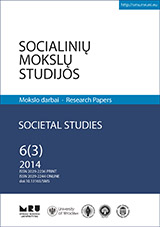Trečiosios universitetų misijos poveikis mokslo žinių sklaidai universitetinėse studijose
Impact of Universities’ Third Mission to Dissemination and Integration of Scientific Knowledge in Study Process in Universities
Author(s): Marija Stonkienė, Renata MatkevičienėSubject(s): Anthropology
Published by: Mykolas Romeris University
Keywords: university; dissemination of scientific knowledge; universities’ third mission; national reform of higher education in 2009; studies; study programs; regulation
Summary/Abstract: The paper discusses the impact of development of knowledge economy to the universities’ activities, suggesting that providing the status of the product to the knowledge as the main field of activities of universities change not only the operating conditions of universities, but at the same time stress the meaningful contribution of universities to economic growth and social development. Changing conditions for delivery of universities’ practices encourage universities to become a part of a knowledge network as innovation agents to enhance cooperation with industry. Declining public resources, growing competition in the dissemination of knowledge in the scientific field stimulate universities’ entrepreneurship, application of their performance and results. All this justifies the idea of transformation of universities’ mission: from traditional universities’ functions, such as delivery of academic studies and scientific research, to dissemination of scientific knowledge, a traditional dissemination of scientific knowledge changes has been supplemented by application of scientific knowledge in collaboration with industry or for wellbeing of society. Contemporary changes taking place in universities consolidate the formation of the third mission of universities. The third mission of universities is based on the concept of an entrepreneurial university and the prominence of provided practical benefits of the universities’ activities. According to a theoretical approach, the systems associated with the fact that the traditional European higher education as a part of state-led social policy with a focus on meeting the social, cultural needs of society, creation of public resources changes because of growing importance of market ideology, neoliberalism, that reasons implementation of new public management in higher education. New public management stresses changing performance of universities toward practical applicability of scientific knowledge and meeting not only social needs of society, but market needs, as well. The article states that in 2009, when reform of Lithuanian national system of higher education made some corrections in the system of higher education funding, universities spurring competition created conditions for entrepreneurial universities. Changes in the system of higher education also made an impact to requirements of application of scientific results in study process, as well as meeting the needs and integration of various stakeholders into universities’ activities.
Journal: Socialinių mokslų studijos
- Issue Year: 6/2014
- Issue No: 3
- Page Range: 611-632
- Page Count: 22
- Language: Lithuanian

